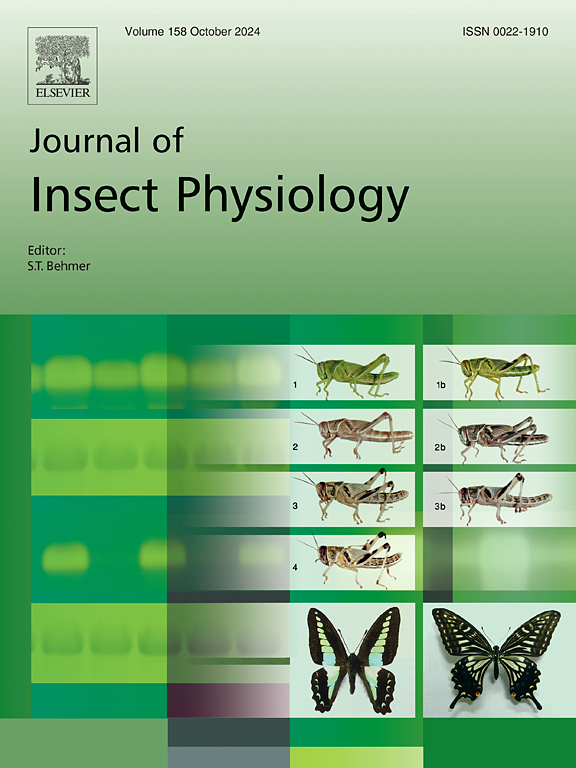Timing of starvation determines its effects on susceptibility to bacterial infection in female fruit flies independent of host evolutionary history
IF 2.3
2区 农林科学
Q1 ENTOMOLOGY
引用次数: 0
Abstract
An organism’s susceptibility to pathogens is contingent on various environmental factors, including the availability of nutrition. Starvation can alter host susceptibility to infections, either directly via depletion of resources essential for proper functioning of the immune system, or indirectly via the various physiological changes it induces within the host body. We tested if the susceptibility of Drosophila melanogaster populations to Enterococcus faecalis infection is interactively affected by (a) whether the hosts are starved before or after the infection, and (b) the evolutionary history of the host. Hosts from laboratory fly populations that have been experimentally evolved to be more resistant to E. faecalis, and their corresponding control populations, were subjected to infection with or without being starved prior to and after being infected. We found that the effect of starvation on susceptibility to E. faecalis changed with the timing of starvation: starvation after infection improved survival of infected hosts, irrespective of how they were treated before infection, while starving only prior to infection (and not after) compromised post-infection survival. The changes in infection susceptibility were uniform in both the evolved and the control populations, suggesting that the effects of starvation are not dependent on pre-existing resistance to the infecting pathogen.

饥饿时间决定了雌性果蝇对细菌感染易感性的影响,与宿主的进化史无关。
生物体对病原体的易感性取决于各种环境因素,包括营养的可得性。饥饿可以改变宿主对感染的易感性,要么直接通过耗尽免疫系统正常运作所必需的资源,要么间接通过它在宿主体内引起的各种生理变化。我们测试了黑腹果蝇种群对粪肠球菌感染的易感性是否受到(a)宿主在感染前或感染后是否饥饿以及(b)宿主的进化史的影响。在实验中进化出对粪肠杆菌具有更强抵抗力的实验室蝇种群的宿主及其相应的对照种群,在感染前和感染后分别受到或不受饥饿的感染。我们发现,饥饿对粪肠球菌易感性的影响随着饥饿时间的变化而变化:感染后的饥饿提高了感染宿主的存活率,无论它们在感染前如何治疗,而仅在感染前(而不是在感染后)饥饿会损害感染后的存活率。在进化种群和对照种群中,感染易感性的变化是一致的,这表明饥饿的影响并不依赖于对感染病原体预先存在的抗性。
本文章由计算机程序翻译,如有差异,请以英文原文为准。
求助全文
约1分钟内获得全文
求助全文
来源期刊

Journal of insect physiology
生物-昆虫学
CiteScore
4.50
自引率
4.50%
发文量
77
审稿时长
57 days
期刊介绍:
All aspects of insect physiology are published in this journal which will also accept papers on the physiology of other arthropods, if the referees consider the work to be of general interest. The coverage includes endocrinology (in relation to moulting, reproduction and metabolism), pheromones, neurobiology (cellular, integrative and developmental), physiological pharmacology, nutrition (food selection, digestion and absorption), homeostasis, excretion, reproduction and behaviour. Papers covering functional genomics and molecular approaches to physiological problems will also be included. Communications on structure and applied entomology can be published if the subject matter has an explicit bearing on the physiology of arthropods. Review articles and novel method papers are also welcomed.
 求助内容:
求助内容: 应助结果提醒方式:
应助结果提醒方式:


